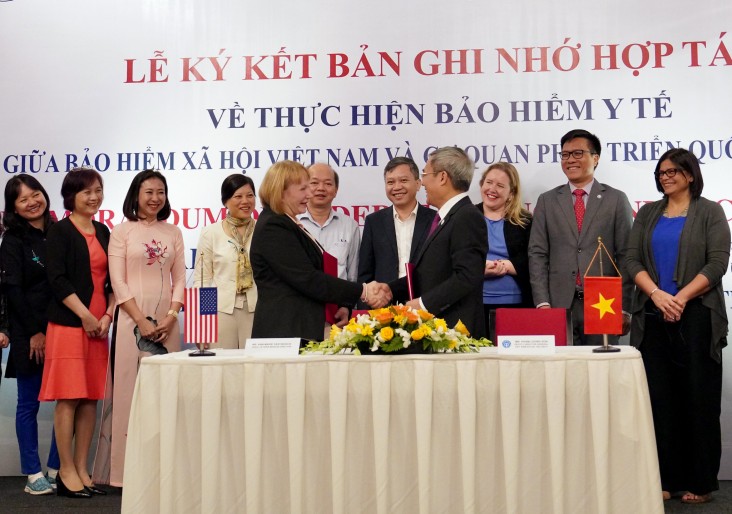Press Release Shim
Speeches Shim

For Immediate Release
HANOI, November 6, 2020 -- Today, the United States Agency for International Development (USAID) Vietnam Mission Director Ann Marie Yastishock and Vietnam Social Security (VSS) Deputy General Director Dr. Phạm Lương Sơn signed a Memorandum of Understanding (MOU), formalizing that the USAID Local Health System Sustainability project will provide technical assistance to VSS to improve its Social Health Insurance (SHI) implementation for the next four years. The project will also support Vietnam’s transition to full financial ownership of its HIV and tuberculosis responses.
During the signing ceremony Mission Director Yastishock said, “We value our close partnership with VSS and will continue our work together to strengthen the governance and financial management capacity of VSS to manage SHI funds effectively, efficiently, equitably, and with accountability. The MOU signing reinforces USAID’s commitment to support Vietnam’s efforts in its journey to self-reliance towards achieving strong, sustainable health systems as a means to support access to universal health coverage.”
USAID’s assistance to VSS will focus on three key areas: (i) SHI policy implementation, (ii) management of SHI drugs and medical supplies, and (iii) exchange of information on health insurance policies, application of health technology and social health information systems.
Over the last five years, USAID has worked closely with Vietnamese Government agencies, including VSS, to include coverage of HIV treatment services and antiretroviral (ARV) drugs in the SHI scheme. This considerable effort included updating over 20 policies to allow expansion of SHI to cover HIV treatment and ARVs, and transitioning 440 stand-alone HIV clinics into the national public health system so they can get reimbursed for providing HIV services. As a result, over 90 percent of persons living with HIV nationwide are now enrolled and use SHI-covered HIV services, and this year, SHI is set to procure ARVs for more than two-thirds of all HIV patients nationwide.
To view photos of the event, visit: https://flic.kr/s/aHsmRTSPqA
Related Press Releases
- USAID Launches New Project to Support Vietnam’s Commitment to End HIV/AIDS and Tuberculosis by 2030
- The United States Agency for International Development Announces Completion of its Green Annamites Project
- National Security Advisor Robert O’Brien Announces $20 Million in USAID Funding to Clean Up Agent Orange Contamination in the Socialist Republic of Vietnam

Comment
Make a general inquiry or suggest an improvement.